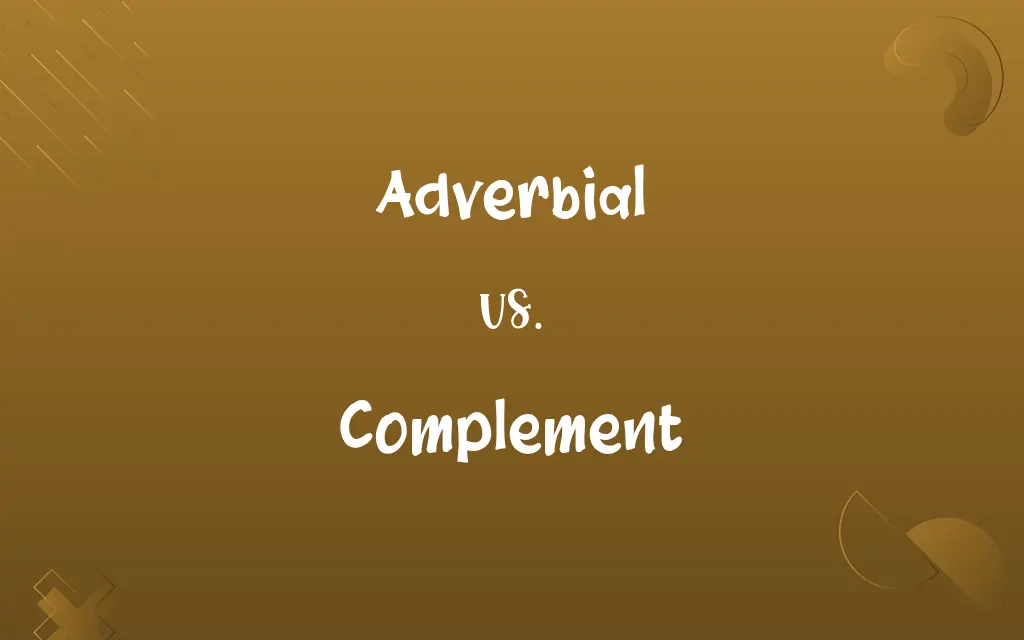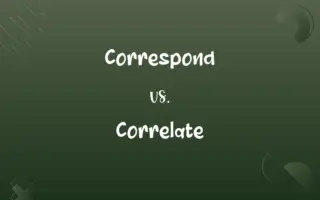Adverbial vs. Complement: Know the Difference
Adverbial modifies verbs, adjectives, or other adverbs, indicating manner, place, time, etc. Complement completes a clause, typically referring to subject or object.

Key Differences
An adverbial is a word or phrase that functions as an adverb, modifying a verb, adjective, or another adverb, often by providing context such as time, place, manner, or degree. For example, in "She sings beautifully," "beautifully" is an adverbial modifying the verb "sings." On the other hand, a complement is a word or phrase that completes the meaning of a predicate in a sentence. Complements can refer to subjects or objects and provide essential information without which a sentence may be incomplete. For instance, in "She is a singer," "a singer" is a complement that completes the meaning of the subject "she."
Adverbials can be optional in a sentence and often enhance the description by providing additional details. They are flexible in their placement within the sentence. For example, "Quickly, he ran to the store" and "He ran to the store quickly" both use "quickly" as an adverbial. Complements, however, are usually necessary for the sentence to be grammatically complete and meaningful. They directly relate to the verb and are more fixed in their position. In the sentence "He became a doctor," "a doctor" is a complement that is crucial for completing the idea conveyed by the verb "became."
Adverbials are diverse in their forms; they can be single adverbs, adverbial phrases, or adverbial clauses. For instance, "slowly," "in the morning," and "as the sun rose" can all function as adverbials. Complements, in contrast, are often noun phrases or adjective phrases that provide specific information about the subject or object. For example, in "She felt happy," "happy" is an adjective complement, and in "I read the book," "the book" is a noun phrase complement.
The role of adverbials is to modify and give more information about the action or state described by the verb. They answer questions like how, when, where, and why. For instance, in "He spoke loudly," "loudly" tells us how he spoke. Complements do not modify but rather complete the meaning of a sentence. They can be subject complements, which follow linking verbs and describe the subject, or object complements, which follow and modify a direct object. For example, in "The sky is blue," "blue" is a subject complement describing "the sky."
In summary, adverbials and complements serve distinct functions in a sentence. Adverbials add descriptive detail and are flexible in placement and form, enhancing the meaning conveyed by the verb, adjective, or adverb. Complements, however, are integral to completing the meaning of a sentence, providing necessary information about the subject or object, and are more fixed in their form and placement.
ADVERTISEMENT
Comparison Chart
Function in Sentence
Modifies verbs, adjectives, or adverbs, adding information like manner, time, place
Completes the meaning of a sentence, often referring to subjects or objects
Types
Can be single words, phrases, or clauses
Often noun phrases or adjective phrases
Placement Flexibility
Flexible in placement within a sentence
Generally fixed, following the verb or object
Grammatical Necessity
Often optional, adding extra detail
Usually necessary for sentence completeness
Answering Questions
Answers how, when, where, why, etc.
Provides essential information about subject or object
ADVERTISEMENT
Adverbial and Complement Definitions
Adverbial
Adverbials can modify adjectives, providing additional detail.
The extremely tall building towered over the city.
Complement
Subject complements follow linking verbs and describe the subject.
The sky looks blue.
Adverbial
An adverbial is a word or phrase that modifies a verb to provide context.
She quickly finished her work.
Complement
Object complements follow and describe or rename a direct object.
They elected her president.
Adverbial
Adverbials can modify other adverbs for emphasis or clarity.
He ran very quickly.
ADVERTISEMENT
Complement
Complements can be noun phrases providing essential information.
We heard the noise.
Adverbial
Adverbials often indicate time, showing when an action happens.
She arrives tomorrow.
Complement
Adjective complements follow linking verbs, adding to the subject's description.
The soup tastes delicious.
Adverbial
Of, relating to, or being an adverb.
Complement
Something that completes, makes up a whole, or brings to perfection
A sauce that is a fine complement to fish.
Adverbial
An adverbial element or phrase.
Complement
The quantity or number needed to make up a whole
Shelves with a full complement of books.
Adverbial
(grammar) Of or relating to an adverb.
Complement
The full crew of personnel required to run a ship.
Adverbial
(grammar) An adverbial word or phrase.
Complement
Either of two parts that complete the whole or mutually complete each other.
Adverbial
Of or pertaining to an adverb; of the nature of an adverb; as, an adverbial phrase or form.
Complement
An angle related to another so that the sum of their measures is 90°.
Adverbial
A word or group of words function as an adverb
Complement
(Grammar) A word or words used to complete a predicate construction, especially the object or indirect object of a verb, for example, the phrase to eat ice cream in We like to eat ice cream.
Adverbial
Of or relating to or functioning as an adverb;
Adverbial syntax
Complement
(Music) An interval that completes an octave when added to a given interval.
Adverbial
Adverbials can denote place, specifying where an action occurs.
They met outside the theater.
Complement
(Immunology) A complex system of proteins found in blood plasma that are sequentially activated and play various roles in the immune response, including lysing bacterial cell membranes, making pathogens more susceptible to phagocytes, and recruiting inflammatory cells to sites of infection or injury. Also called alexin.
Complement
Mathematics & Logic For a universal set, the set of all elements in the set that are not in a specified subset.
Complement
A complementary color.
Complement
To serve as a complement to
Roses in a silver bowl complement the handsome cherry table.
Complement
Something (or someone) that completes; the consummation.
Complement
(obsolete) The act of completing something, or the fact of being complete; completion, completeness, fulfilment.
Complement
The totality, the full amount or number which completes something.
Complement
(obsolete) Something which completes one's equipment, dress etc.; an accessory.
Complement
(nautical) The whole working force of a vessel.
Complement
(heraldry) Fullness (of the moon).
Complement
An angle which, together with a given angle, makes a right angle.
Complement
Something which completes, something which combines with something else to make up a complete whole; loosely, something perceived to be a harmonious or desirable partner or addition.
Complement
A word or group of words that completes a grammatical construction in the predicate and that describes or is identified with the subject or object.
Complement
(music) An interval which, together with the given interval, makes an octave.
Complement
(optics) The color which, when mixed with the given color, gives black (for mixing pigments) or white (for mixing light).
The complement of blue is orange.
Complement
(set theory) Given two sets, the set containing one set's elements that are not members of the other set (whether a relative complement or an absolute complement).
The complement of the odd numbers is the even numbers, relative to the natural numbers.
Complement
(immunology) One of several blood proteins that work with antibodies during an immune response.
Complement
(logic) An expression related to some other expression such that it is true under the same conditions that make other false, and vice versa.
Complement
(electronics) A voltage level with the opposite logical sense to the given one.
Complement
(computing) A bit with the opposite value to the given one; the logical complement of a number.
Complement
The diminished radix complement of a number; the nines' complement of a decimal number; the ones' complement of a binary number.
The complement of is .
Complement
The radix complement of a number; the two's complement of a binary number.
The complement of is .
Complement
The numeric complement of a number.
The complement of −123 is 123.
Complement
(genetics) A nucleotide sequence in which each base is replaced by the complementary base of the given sequence: adenine (A) by thymine (T) or uracil (U), cytosine (C) by guanine (G), and vice versa.
A DNA molecule is formed from two strands, each of which is the complement of the other.
Complement
Obsolete spelling or misspelling of compliment. should this be at a different ety?
Complement
(biochemistry) alexin
Complement
(economics) complementary good
Complement
To complete, to bring to perfection, to make whole.
We believe your addition will complement the team.
Complement
To provide what the partner lacks and lack what the partner provides, thus forming part of a whole.
The flavors of the pepper and garlic complement each other, giving a very rich taste in combination.
I believe our talents really complement each other.
Complement
To change a voltage, number, color, etc. to its complement.
Complement
(obsolete) Old form of compliment
Complement
That which fills up or completes; the quantity or number required to fill a thing or make it complete.
Complement
That which is required to supply a deficiency, or to complete a symmetrical whole.
History is the complement of poetry.
Complement
Full quantity, number, or amount; a complete set; completeness.
To exceed his complement and number appointed him which was one hundred and twenty persons.
Complement
A second quantity added to a given quantity to make it equal to a third given quantity.
Complement
Something added for ornamentation; an accessory.
Without vain art or curious complements.
Complement
The whole working force of a vessel.
Complement
The interval wanting to complete the octave; - the fourth is the complement of the fifth, the sixth of the third.
Complement
A compliment.
Complement
To supply a lack; to supplement.
Complement
To compliment.
Complement
A word or phrase used to complete a grammatical construction
Complement
A complete number or quantity;
A full complement
Complement
Number needed to make up whole force;
A full complement of workers
Complement
Something added to complete or make perfect;
A fine wine is a perfect complement to the dinner
Complement
One of a series of enzymes in the blood serum that are part of the immune response
Complement
Either of two parts that mutually complete each other
Complement
Make complete or perfect; supply what is wanting or form the complement to;
I need some pepper to complement the sweet touch in the soup
Complement
A complement is a word or phrase that completes a sentence's meaning.
He is a teacher.
Repeatedly Asked Queries
Can adverbials be removed from a sentence?
Yes, adverbials are often optional and can be removed without making the sentence grammatically incorrect.
Where can adverbials be placed in a sentence?
Adverbials can be placed at the beginning, middle, or end of a sentence.
What are examples of adverbials?
Examples include "quickly," "in the park," and "every day."
What is an adverbial?
An adverbial is a word or phrase that modifies a verb, adjective, or another adverb to provide additional context like time, manner, or place.
How do adverbials affect sentence meaning?
Adverbials add detail and context to the action or description in a sentence, often answering questions like how, when, and where.
What is a subject complement?
A subject complement follows a linking verb and describes or renames the subject.
How do adverbials differ from adjectives?
Adverbials modify verbs, adjectives, or other adverbs, while adjectives modify nouns.
What is an object complement?
An object complement follows and modifies or renames a direct object.
Can a sentence have multiple adverbials?
Yes, a sentence can have multiple adverbials.
What is a complement in grammar?
A complement is a word or phrase necessary to complete the meaning of a sentence, often providing information about the subject or object.
Are complements essential in a sentence?
Yes, complements are usually necessary for the sentence to be complete and meaningful.
Can adverbials and complements be the same?
No, adverbials and complements serve different functions in a sentence.
Do all sentences have adverbials?
No, adverbials are optional and not present in every sentence.
Are complements part of sentence structure?
Yes, complements are a fundamental part of sentence structure.
Can a complement be a single word?
Yes, complements can be a single word, like a noun or an adjective, or a phrase.
Are complements always adjacent to the verb?
Complements typically follow the verb or object they relate to but are not always immediately adjacent.
Can a phrase be an adverbial?
Yes, phrases can function as adverbials.
Is it possible to have a sentence without a complement?
Yes, not all sentences require complements to be complete.
Do complements answer questions like adverbials?
Complements don't typically answer questions like adverbials; they complete the sentence's meaning.
Can adverbials change a sentence's tone?
Yes, adverbials can significantly alter the tone or emphasis of a sentence.
Share this page
Link for your blog / website
HTML
Link to share via messenger








































































